Reviewing the Impact of Fear of Cancer Recurrence on Breast Cancer
VerifiedAdded on 2023/06/12
|8
|2176
|466
Literature Review
AI Summary
This literature review investigates the significant psychological stress factor of Fear of Cancer Recurrence (FOCR) among breast cancer patients and survivors. It highlights the global statistics of breast cancer diagnoses and mortality rates, emphasizing the increasing incidence and the challenges in managing emotional stress post-treatment. The review aims to identify patients at higher risk of recurrence, understand factors associated with FOCR, and explore the relationship between modifiable and non-modifiable factors influencing FOCR. By examining existing literature, the study seeks to provide insights for healthcare providers to develop tailored support and psychological interventions, ultimately improving the quality of life for breast cancer survivors. The review also covers the rationale and significance of addressing FOCR, given its adverse effects on patients' well-being, and emphasizes the importance of early detection, awareness, and advanced treatments in reducing mortality rates.
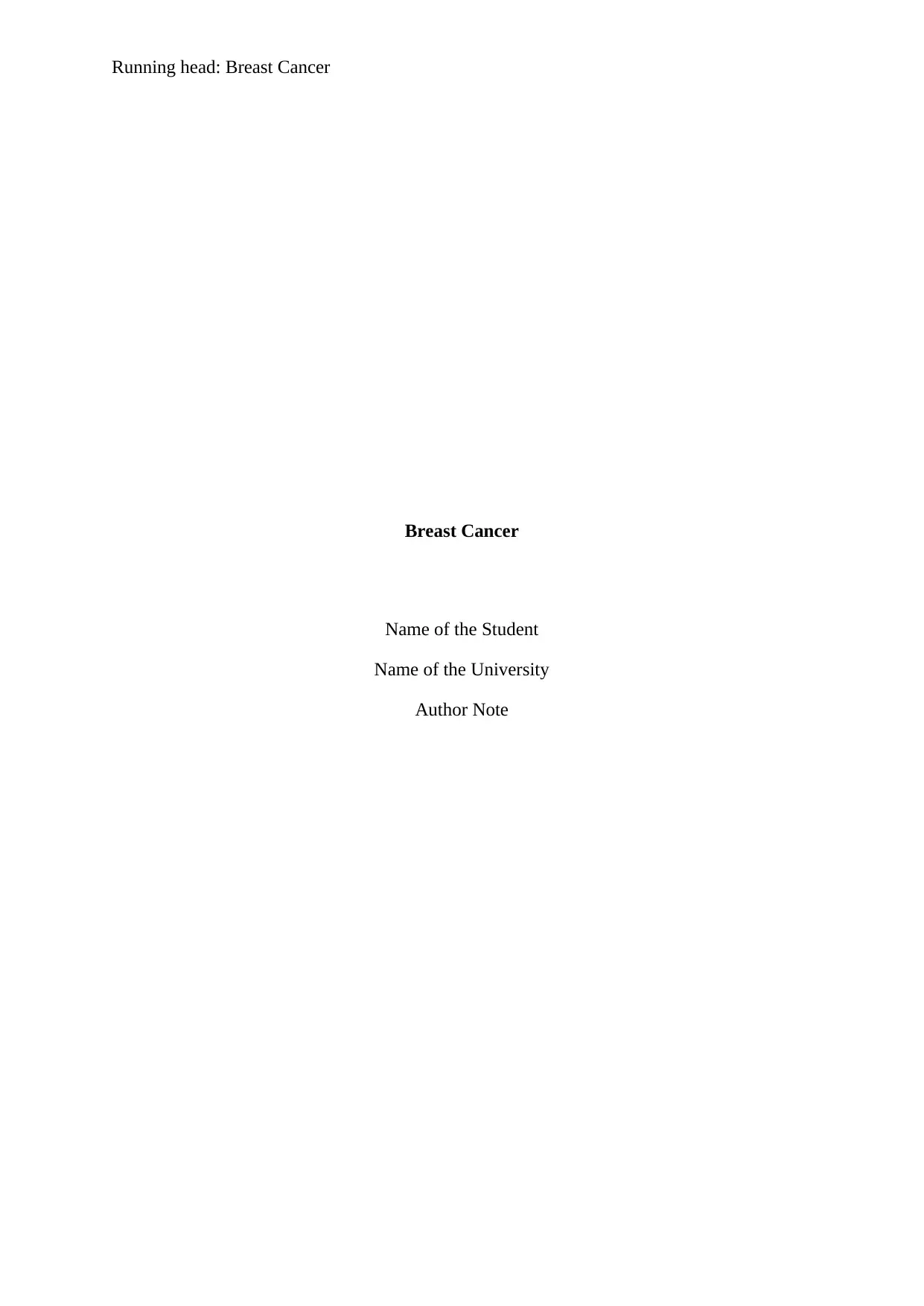
Running head: Breast Cancer
Breast Cancer
Name of the Student
Name of the University
Author Note
Breast Cancer
Name of the Student
Name of the University
Author Note
Paraphrase This Document
Need a fresh take? Get an instant paraphrase of this document with our AI Paraphraser
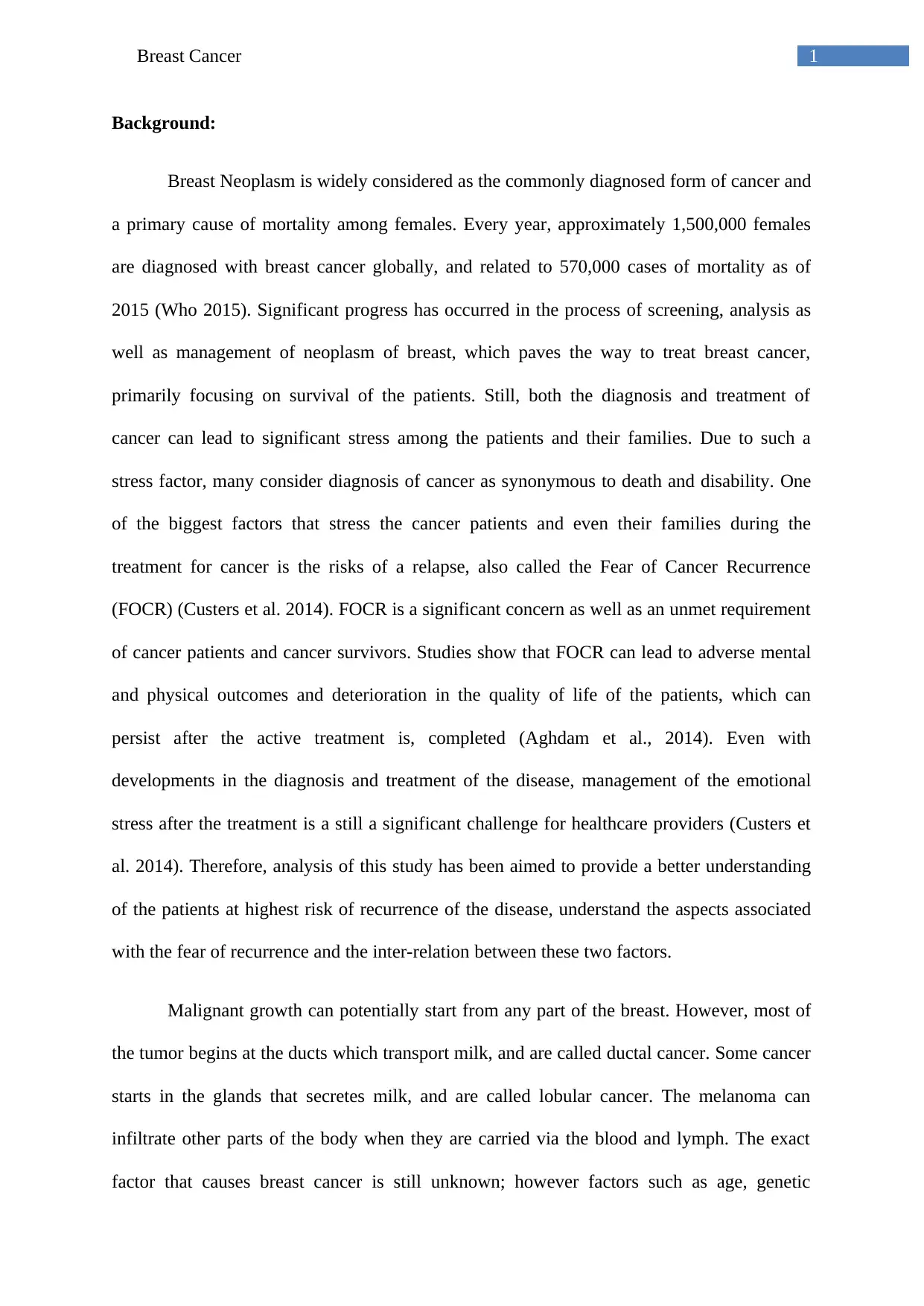
1Breast Cancer
Background:
Breast Neoplasm is widely considered as the commonly diagnosed form of cancer and
a primary cause of mortality among females. Every year, approximately 1,500,000 females
are diagnosed with breast cancer globally, and related to 570,000 cases of mortality as of
2015 (Who 2015). Significant progress has occurred in the process of screening, analysis as
well as management of neoplasm of breast, which paves the way to treat breast cancer,
primarily focusing on survival of the patients. Still, both the diagnosis and treatment of
cancer can lead to significant stress among the patients and their families. Due to such a
stress factor, many consider diagnosis of cancer as synonymous to death and disability. One
of the biggest factors that stress the cancer patients and even their families during the
treatment for cancer is the risks of a relapse, also called the Fear of Cancer Recurrence
(FOCR) (Custers et al. 2014). FOCR is a significant concern as well as an unmet requirement
of cancer patients and cancer survivors. Studies show that FOCR can lead to adverse mental
and physical outcomes and deterioration in the quality of life of the patients, which can
persist after the active treatment is, completed (Aghdam et al., 2014). Even with
developments in the diagnosis and treatment of the disease, management of the emotional
stress after the treatment is a still a significant challenge for healthcare providers (Custers et
al. 2014). Therefore, analysis of this study has been aimed to provide a better understanding
of the patients at highest risk of recurrence of the disease, understand the aspects associated
with the fear of recurrence and the inter-relation between these two factors.
Malignant growth can potentially start from any part of the breast. However, most of
the tumor begins at the ducts which transport milk, and are called ductal cancer. Some cancer
starts in the glands that secretes milk, and are called lobular cancer. The melanoma can
infiltrate other parts of the body when they are carried via the blood and lymph. The exact
factor that causes breast cancer is still unknown; however factors such as age, genetic
Background:
Breast Neoplasm is widely considered as the commonly diagnosed form of cancer and
a primary cause of mortality among females. Every year, approximately 1,500,000 females
are diagnosed with breast cancer globally, and related to 570,000 cases of mortality as of
2015 (Who 2015). Significant progress has occurred in the process of screening, analysis as
well as management of neoplasm of breast, which paves the way to treat breast cancer,
primarily focusing on survival of the patients. Still, both the diagnosis and treatment of
cancer can lead to significant stress among the patients and their families. Due to such a
stress factor, many consider diagnosis of cancer as synonymous to death and disability. One
of the biggest factors that stress the cancer patients and even their families during the
treatment for cancer is the risks of a relapse, also called the Fear of Cancer Recurrence
(FOCR) (Custers et al. 2014). FOCR is a significant concern as well as an unmet requirement
of cancer patients and cancer survivors. Studies show that FOCR can lead to adverse mental
and physical outcomes and deterioration in the quality of life of the patients, which can
persist after the active treatment is, completed (Aghdam et al., 2014). Even with
developments in the diagnosis and treatment of the disease, management of the emotional
stress after the treatment is a still a significant challenge for healthcare providers (Custers et
al. 2014). Therefore, analysis of this study has been aimed to provide a better understanding
of the patients at highest risk of recurrence of the disease, understand the aspects associated
with the fear of recurrence and the inter-relation between these two factors.
Malignant growth can potentially start from any part of the breast. However, most of
the tumor begins at the ducts which transport milk, and are called ductal cancer. Some cancer
starts in the glands that secretes milk, and are called lobular cancer. The melanoma can
infiltrate other parts of the body when they are carried via the blood and lymph. The exact
factor that causes breast cancer is still unknown; however factors such as age, genetic
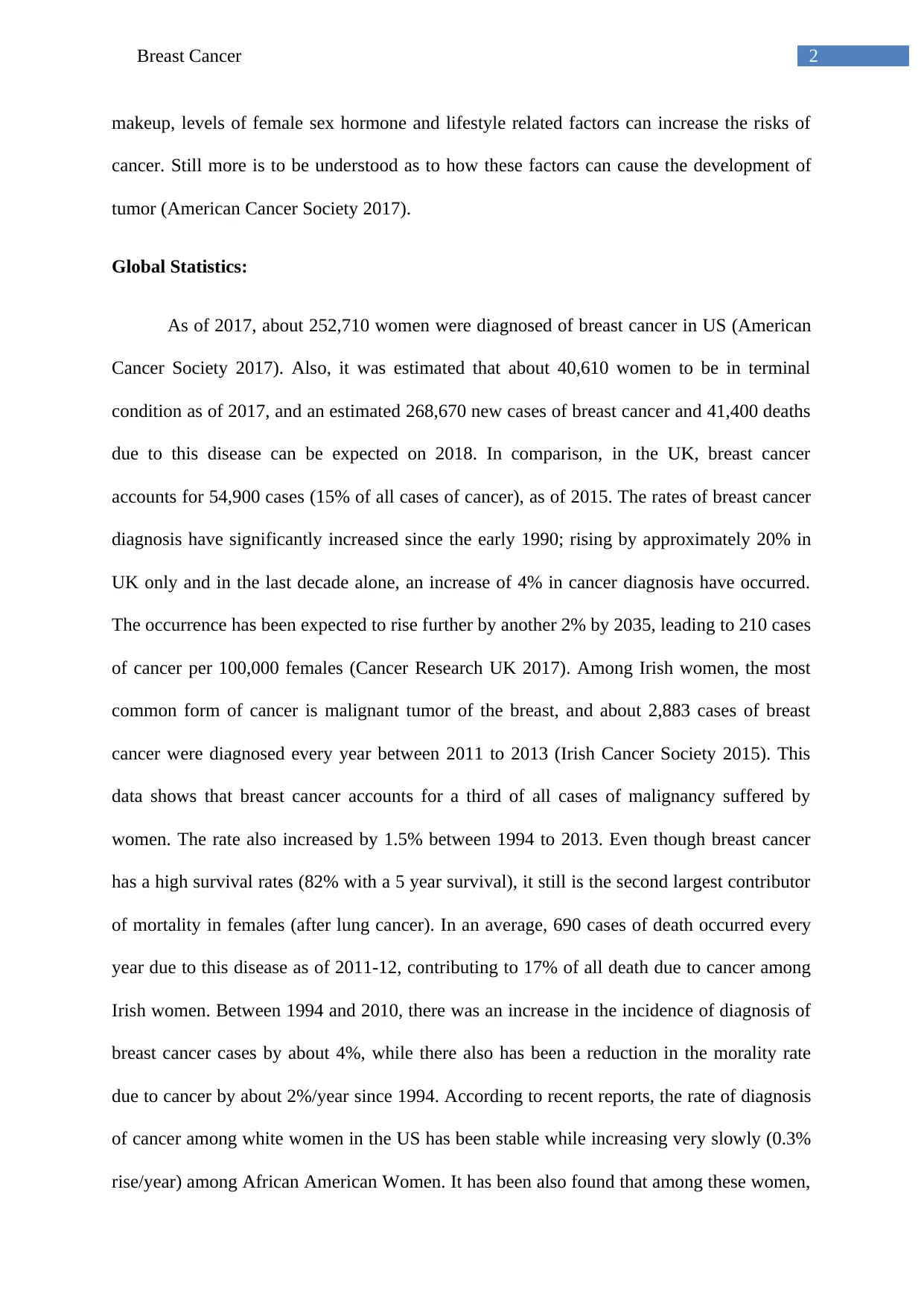
2Breast Cancer
makeup, levels of female sex hormone and lifestyle related factors can increase the risks of
cancer. Still more is to be understood as to how these factors can cause the development of
tumor (American Cancer Society 2017).
Global Statistics:
As of 2017, about 252,710 women were diagnosed of breast cancer in US (American
Cancer Society 2017). Also, it was estimated that about 40,610 women to be in terminal
condition as of 2017, and an estimated 268,670 new cases of breast cancer and 41,400 deaths
due to this disease can be expected on 2018. In comparison, in the UK, breast cancer
accounts for 54,900 cases (15% of all cases of cancer), as of 2015. The rates of breast cancer
diagnosis have significantly increased since the early 1990; rising by approximately 20% in
UK only and in the last decade alone, an increase of 4% in cancer diagnosis have occurred.
The occurrence has been expected to rise further by another 2% by 2035, leading to 210 cases
of cancer per 100,000 females (Cancer Research UK 2017). Among Irish women, the most
common form of cancer is malignant tumor of the breast, and about 2,883 cases of breast
cancer were diagnosed every year between 2011 to 2013 (Irish Cancer Society 2015). This
data shows that breast cancer accounts for a third of all cases of malignancy suffered by
women. The rate also increased by 1.5% between 1994 to 2013. Even though breast cancer
has a high survival rates (82% with a 5 year survival), it still is the second largest contributor
of mortality in females (after lung cancer). In an average, 690 cases of death occurred every
year due to this disease as of 2011-12, contributing to 17% of all death due to cancer among
Irish women. Between 1994 and 2010, there was an increase in the incidence of diagnosis of
breast cancer cases by about 4%, while there also has been a reduction in the morality rate
due to cancer by about 2%/year since 1994. According to recent reports, the rate of diagnosis
of cancer among white women in the US has been stable while increasing very slowly (0.3%
rise/year) among African American Women. It has been also found that among these women,
makeup, levels of female sex hormone and lifestyle related factors can increase the risks of
cancer. Still more is to be understood as to how these factors can cause the development of
tumor (American Cancer Society 2017).
Global Statistics:
As of 2017, about 252,710 women were diagnosed of breast cancer in US (American
Cancer Society 2017). Also, it was estimated that about 40,610 women to be in terminal
condition as of 2017, and an estimated 268,670 new cases of breast cancer and 41,400 deaths
due to this disease can be expected on 2018. In comparison, in the UK, breast cancer
accounts for 54,900 cases (15% of all cases of cancer), as of 2015. The rates of breast cancer
diagnosis have significantly increased since the early 1990; rising by approximately 20% in
UK only and in the last decade alone, an increase of 4% in cancer diagnosis have occurred.
The occurrence has been expected to rise further by another 2% by 2035, leading to 210 cases
of cancer per 100,000 females (Cancer Research UK 2017). Among Irish women, the most
common form of cancer is malignant tumor of the breast, and about 2,883 cases of breast
cancer were diagnosed every year between 2011 to 2013 (Irish Cancer Society 2015). This
data shows that breast cancer accounts for a third of all cases of malignancy suffered by
women. The rate also increased by 1.5% between 1994 to 2013. Even though breast cancer
has a high survival rates (82% with a 5 year survival), it still is the second largest contributor
of mortality in females (after lung cancer). In an average, 690 cases of death occurred every
year due to this disease as of 2011-12, contributing to 17% of all death due to cancer among
Irish women. Between 1994 and 2010, there was an increase in the incidence of diagnosis of
breast cancer cases by about 4%, while there also has been a reduction in the morality rate
due to cancer by about 2%/year since 1994. According to recent reports, the rate of diagnosis
of cancer among white women in the US has been stable while increasing very slowly (0.3%
rise/year) among African American Women. It has been also found that among these women,
⊘ This is a preview!⊘
Do you want full access?
Subscribe today to unlock all pages.

Trusted by 1+ million students worldwide
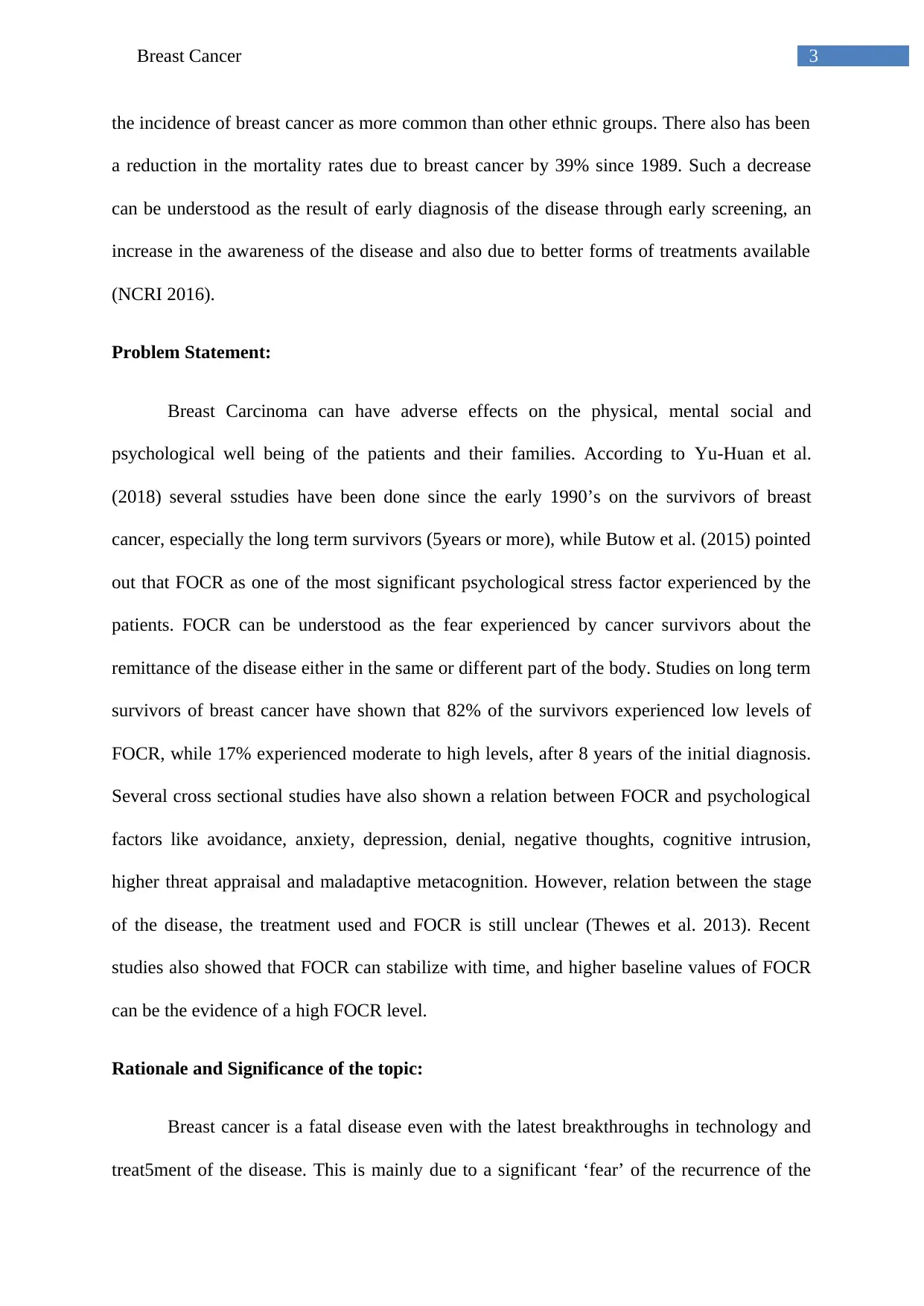
3Breast Cancer
the incidence of breast cancer as more common than other ethnic groups. There also has been
a reduction in the mortality rates due to breast cancer by 39% since 1989. Such a decrease
can be understood as the result of early diagnosis of the disease through early screening, an
increase in the awareness of the disease and also due to better forms of treatments available
(NCRI 2016).
Problem Statement:
Breast Carcinoma can have adverse effects on the physical, mental social and
psychological well being of the patients and their families. According to Yu-Huan et al.
(2018) several sstudies have been done since the early 1990’s on the survivors of breast
cancer, especially the long term survivors (5years or more), while Butow et al. (2015) pointed
out that FOCR as one of the most significant psychological stress factor experienced by the
patients. FOCR can be understood as the fear experienced by cancer survivors about the
remittance of the disease either in the same or different part of the body. Studies on long term
survivors of breast cancer have shown that 82% of the survivors experienced low levels of
FOCR, while 17% experienced moderate to high levels, after 8 years of the initial diagnosis.
Several cross sectional studies have also shown a relation between FOCR and psychological
factors like avoidance, anxiety, depression, denial, negative thoughts, cognitive intrusion,
higher threat appraisal and maladaptive metacognition. However, relation between the stage
of the disease, the treatment used and FOCR is still unclear (Thewes et al. 2013). Recent
studies also showed that FOCR can stabilize with time, and higher baseline values of FOCR
can be the evidence of a high FOCR level.
Rationale and Significance of the topic:
Breast cancer is a fatal disease even with the latest breakthroughs in technology and
treat5ment of the disease. This is mainly due to a significant ‘fear’ of the recurrence of the
the incidence of breast cancer as more common than other ethnic groups. There also has been
a reduction in the mortality rates due to breast cancer by 39% since 1989. Such a decrease
can be understood as the result of early diagnosis of the disease through early screening, an
increase in the awareness of the disease and also due to better forms of treatments available
(NCRI 2016).
Problem Statement:
Breast Carcinoma can have adverse effects on the physical, mental social and
psychological well being of the patients and their families. According to Yu-Huan et al.
(2018) several sstudies have been done since the early 1990’s on the survivors of breast
cancer, especially the long term survivors (5years or more), while Butow et al. (2015) pointed
out that FOCR as one of the most significant psychological stress factor experienced by the
patients. FOCR can be understood as the fear experienced by cancer survivors about the
remittance of the disease either in the same or different part of the body. Studies on long term
survivors of breast cancer have shown that 82% of the survivors experienced low levels of
FOCR, while 17% experienced moderate to high levels, after 8 years of the initial diagnosis.
Several cross sectional studies have also shown a relation between FOCR and psychological
factors like avoidance, anxiety, depression, denial, negative thoughts, cognitive intrusion,
higher threat appraisal and maladaptive metacognition. However, relation between the stage
of the disease, the treatment used and FOCR is still unclear (Thewes et al. 2013). Recent
studies also showed that FOCR can stabilize with time, and higher baseline values of FOCR
can be the evidence of a high FOCR level.
Rationale and Significance of the topic:
Breast cancer is a fatal disease even with the latest breakthroughs in technology and
treat5ment of the disease. This is mainly due to a significant ‘fear’ of the recurrence of the
Paraphrase This Document
Need a fresh take? Get an instant paraphrase of this document with our AI Paraphraser
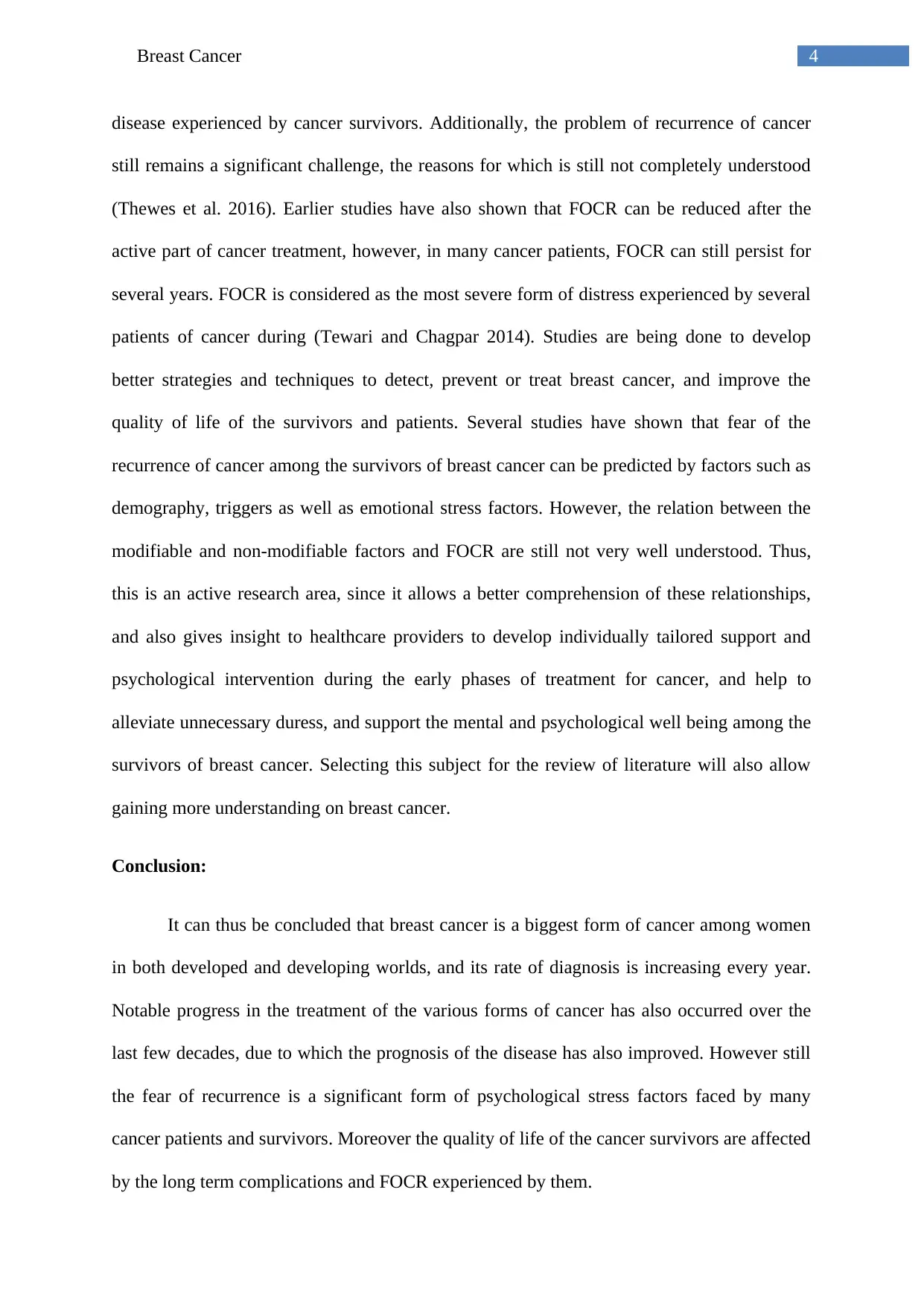
4Breast Cancer
disease experienced by cancer survivors. Additionally, the problem of recurrence of cancer
still remains a significant challenge, the reasons for which is still not completely understood
(Thewes et al. 2016). Earlier studies have also shown that FOCR can be reduced after the
active part of cancer treatment, however, in many cancer patients, FOCR can still persist for
several years. FOCR is considered as the most severe form of distress experienced by several
patients of cancer during (Tewari and Chagpar 2014). Studies are being done to develop
better strategies and techniques to detect, prevent or treat breast cancer, and improve the
quality of life of the survivors and patients. Several studies have shown that fear of the
recurrence of cancer among the survivors of breast cancer can be predicted by factors such as
demography, triggers as well as emotional stress factors. However, the relation between the
modifiable and non-modifiable factors and FOCR are still not very well understood. Thus,
this is an active research area, since it allows a better comprehension of these relationships,
and also gives insight to healthcare providers to develop individually tailored support and
psychological intervention during the early phases of treatment for cancer, and help to
alleviate unnecessary duress, and support the mental and psychological well being among the
survivors of breast cancer. Selecting this subject for the review of literature will also allow
gaining more understanding on breast cancer.
Conclusion:
It can thus be concluded that breast cancer is a biggest form of cancer among women
in both developed and developing worlds, and its rate of diagnosis is increasing every year.
Notable progress in the treatment of the various forms of cancer has also occurred over the
last few decades, due to which the prognosis of the disease has also improved. However still
the fear of recurrence is a significant form of psychological stress factors faced by many
cancer patients and survivors. Moreover the quality of life of the cancer survivors are affected
by the long term complications and FOCR experienced by them.
disease experienced by cancer survivors. Additionally, the problem of recurrence of cancer
still remains a significant challenge, the reasons for which is still not completely understood
(Thewes et al. 2016). Earlier studies have also shown that FOCR can be reduced after the
active part of cancer treatment, however, in many cancer patients, FOCR can still persist for
several years. FOCR is considered as the most severe form of distress experienced by several
patients of cancer during (Tewari and Chagpar 2014). Studies are being done to develop
better strategies and techniques to detect, prevent or treat breast cancer, and improve the
quality of life of the survivors and patients. Several studies have shown that fear of the
recurrence of cancer among the survivors of breast cancer can be predicted by factors such as
demography, triggers as well as emotional stress factors. However, the relation between the
modifiable and non-modifiable factors and FOCR are still not very well understood. Thus,
this is an active research area, since it allows a better comprehension of these relationships,
and also gives insight to healthcare providers to develop individually tailored support and
psychological intervention during the early phases of treatment for cancer, and help to
alleviate unnecessary duress, and support the mental and psychological well being among the
survivors of breast cancer. Selecting this subject for the review of literature will also allow
gaining more understanding on breast cancer.
Conclusion:
It can thus be concluded that breast cancer is a biggest form of cancer among women
in both developed and developing worlds, and its rate of diagnosis is increasing every year.
Notable progress in the treatment of the various forms of cancer has also occurred over the
last few decades, due to which the prognosis of the disease has also improved. However still
the fear of recurrence is a significant form of psychological stress factors faced by many
cancer patients and survivors. Moreover the quality of life of the cancer survivors are affected
by the long term complications and FOCR experienced by them.
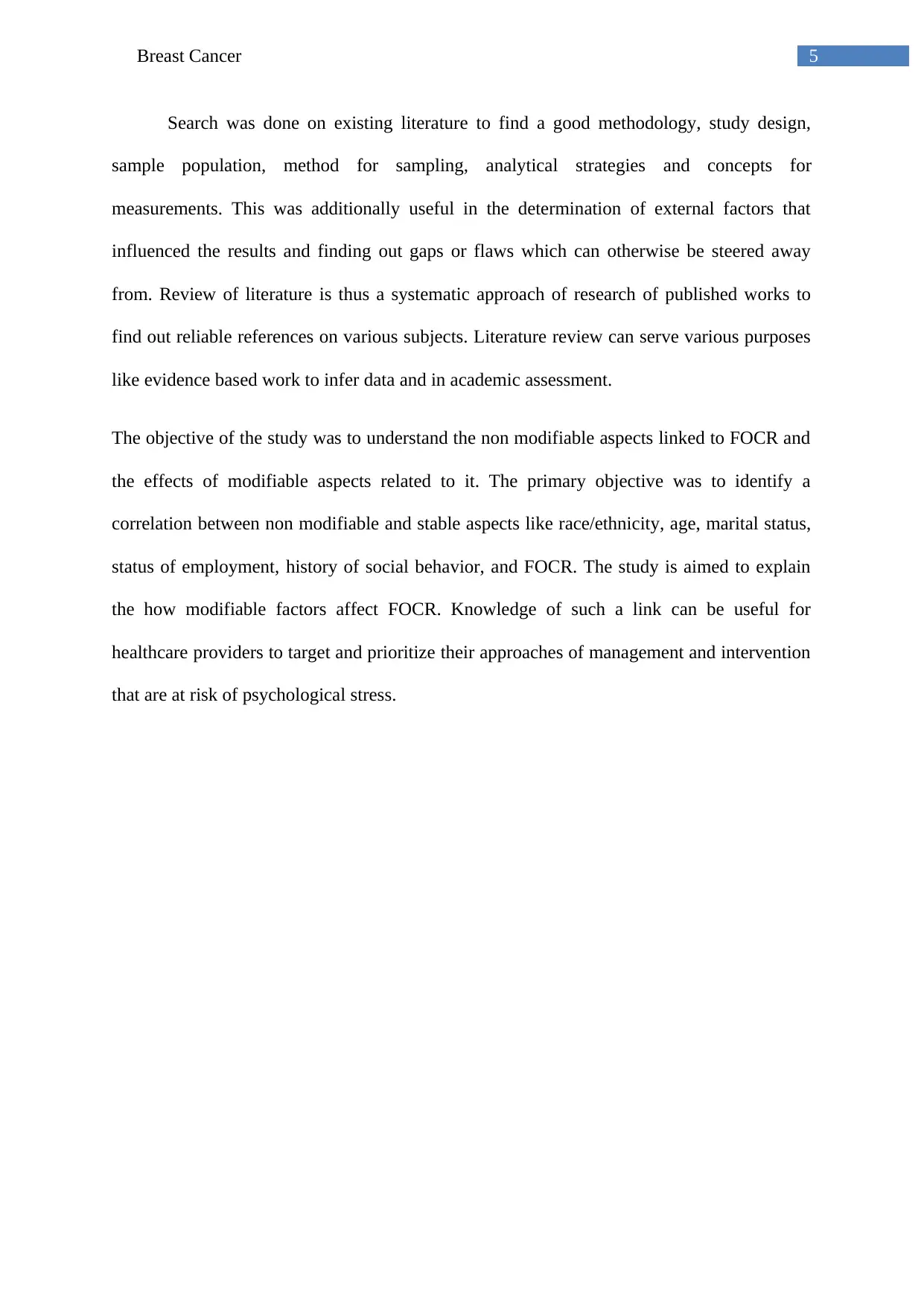
5Breast Cancer
Search was done on existing literature to find a good methodology, study design,
sample population, method for sampling, analytical strategies and concepts for
measurements. This was additionally useful in the determination of external factors that
influenced the results and finding out gaps or flaws which can otherwise be steered away
from. Review of literature is thus a systematic approach of research of published works to
find out reliable references on various subjects. Literature review can serve various purposes
like evidence based work to infer data and in academic assessment.
The objective of the study was to understand the non modifiable aspects linked to FOCR and
the effects of modifiable aspects related to it. The primary objective was to identify a
correlation between non modifiable and stable aspects like race/ethnicity, age, marital status,
status of employment, history of social behavior, and FOCR. The study is aimed to explain
the how modifiable factors affect FOCR. Knowledge of such a link can be useful for
healthcare providers to target and prioritize their approaches of management and intervention
that are at risk of psychological stress.
Search was done on existing literature to find a good methodology, study design,
sample population, method for sampling, analytical strategies and concepts for
measurements. This was additionally useful in the determination of external factors that
influenced the results and finding out gaps or flaws which can otherwise be steered away
from. Review of literature is thus a systematic approach of research of published works to
find out reliable references on various subjects. Literature review can serve various purposes
like evidence based work to infer data and in academic assessment.
The objective of the study was to understand the non modifiable aspects linked to FOCR and
the effects of modifiable aspects related to it. The primary objective was to identify a
correlation between non modifiable and stable aspects like race/ethnicity, age, marital status,
status of employment, history of social behavior, and FOCR. The study is aimed to explain
the how modifiable factors affect FOCR. Knowledge of such a link can be useful for
healthcare providers to target and prioritize their approaches of management and intervention
that are at risk of psychological stress.
⊘ This is a preview!⊘
Do you want full access?
Subscribe today to unlock all pages.

Trusted by 1+ million students worldwide
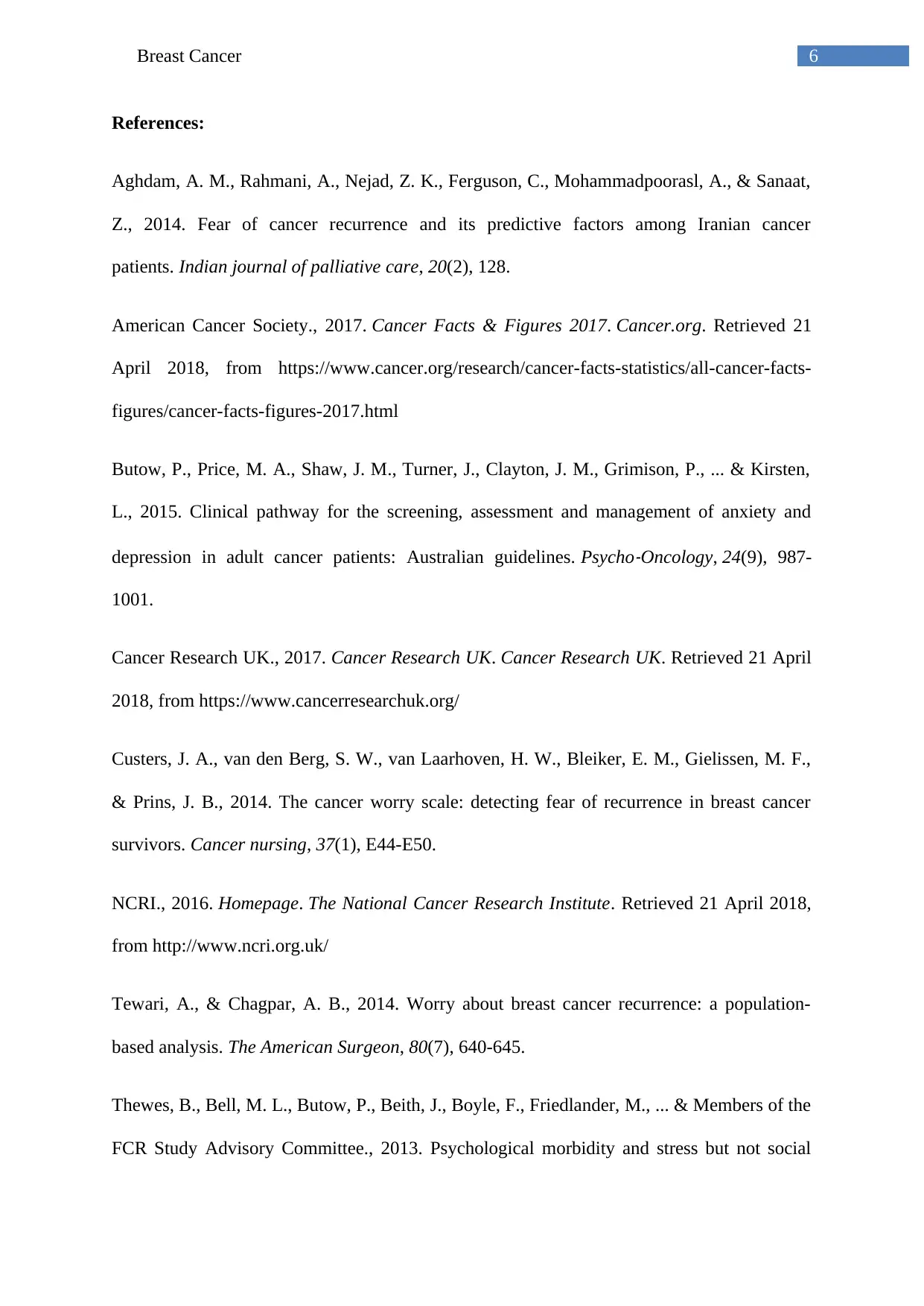
6Breast Cancer
References:
Aghdam, A. M., Rahmani, A., Nejad, Z. K., Ferguson, C., Mohammadpoorasl, A., & Sanaat,
Z., 2014. Fear of cancer recurrence and its predictive factors among Iranian cancer
patients. Indian journal of palliative care, 20(2), 128.
American Cancer Society., 2017. Cancer Facts & Figures 2017. Cancer.org. Retrieved 21
April 2018, from https://www.cancer.org/research/cancer-facts-statistics/all-cancer-facts-
figures/cancer-facts-figures-2017.html
Butow, P., Price, M. A., Shaw, J. M., Turner, J., Clayton, J. M., Grimison, P., ... & Kirsten,
L., 2015. Clinical pathway for the screening, assessment and management of anxiety and
depression in adult cancer patients: Australian guidelines. Psycho
‐Oncology, 24(9), 987-
1001.
Cancer Research UK., 2017. Cancer Research UK. Cancer Research UK. Retrieved 21 April
2018, from https://www.cancerresearchuk.org/
Custers, J. A., van den Berg, S. W., van Laarhoven, H. W., Bleiker, E. M., Gielissen, M. F.,
& Prins, J. B., 2014. The cancer worry scale: detecting fear of recurrence in breast cancer
survivors. Cancer nursing, 37(1), E44-E50.
NCRI., 2016. Homepage. The National Cancer Research Institute. Retrieved 21 April 2018,
from http://www.ncri.org.uk/
Tewari, A., & Chagpar, A. B., 2014. Worry about breast cancer recurrence: a population-
based analysis. The American Surgeon, 80(7), 640-645.
Thewes, B., Bell, M. L., Butow, P., Beith, J., Boyle, F., Friedlander, M., ... & Members of the
FCR Study Advisory Committee., 2013. Psychological morbidity and stress but not social
References:
Aghdam, A. M., Rahmani, A., Nejad, Z. K., Ferguson, C., Mohammadpoorasl, A., & Sanaat,
Z., 2014. Fear of cancer recurrence and its predictive factors among Iranian cancer
patients. Indian journal of palliative care, 20(2), 128.
American Cancer Society., 2017. Cancer Facts & Figures 2017. Cancer.org. Retrieved 21
April 2018, from https://www.cancer.org/research/cancer-facts-statistics/all-cancer-facts-
figures/cancer-facts-figures-2017.html
Butow, P., Price, M. A., Shaw, J. M., Turner, J., Clayton, J. M., Grimison, P., ... & Kirsten,
L., 2015. Clinical pathway for the screening, assessment and management of anxiety and
depression in adult cancer patients: Australian guidelines. Psycho
‐Oncology, 24(9), 987-
1001.
Cancer Research UK., 2017. Cancer Research UK. Cancer Research UK. Retrieved 21 April
2018, from https://www.cancerresearchuk.org/
Custers, J. A., van den Berg, S. W., van Laarhoven, H. W., Bleiker, E. M., Gielissen, M. F.,
& Prins, J. B., 2014. The cancer worry scale: detecting fear of recurrence in breast cancer
survivors. Cancer nursing, 37(1), E44-E50.
NCRI., 2016. Homepage. The National Cancer Research Institute. Retrieved 21 April 2018,
from http://www.ncri.org.uk/
Tewari, A., & Chagpar, A. B., 2014. Worry about breast cancer recurrence: a population-
based analysis. The American Surgeon, 80(7), 640-645.
Thewes, B., Bell, M. L., Butow, P., Beith, J., Boyle, F., Friedlander, M., ... & Members of the
FCR Study Advisory Committee., 2013. Psychological morbidity and stress but not social
Paraphrase This Document
Need a fresh take? Get an instant paraphrase of this document with our AI Paraphraser
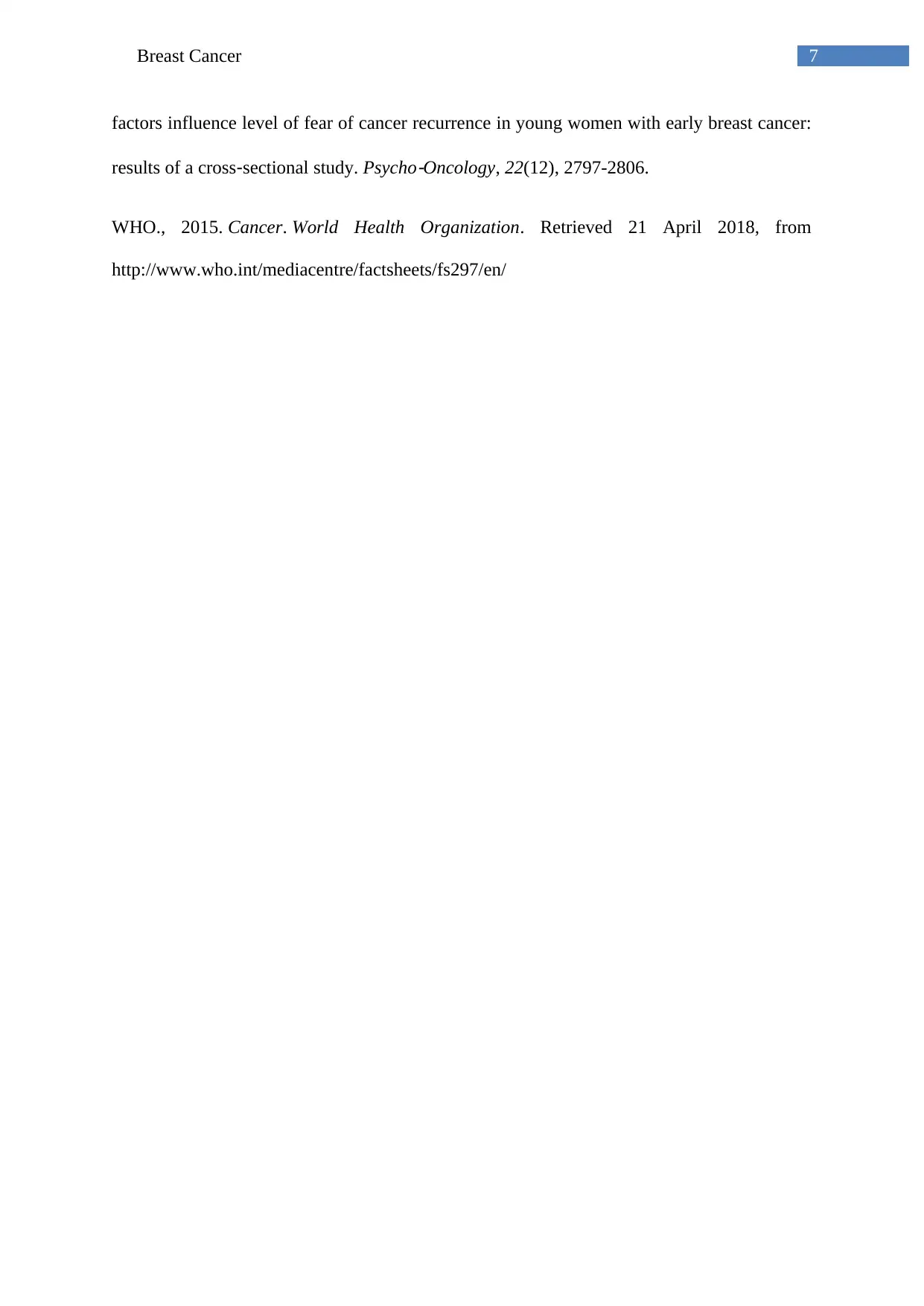
7Breast Cancer
factors influence level of fear of cancer recurrence in young women with early breast cancer:
results of a cross‐sectional study. Psycho
‐Oncology, 22(12), 2797-2806.
WHO., 2015. Cancer. World Health Organization. Retrieved 21 April 2018, from
http://www.who.int/mediacentre/factsheets/fs297/en/
factors influence level of fear of cancer recurrence in young women with early breast cancer:
results of a cross‐sectional study. Psycho
‐Oncology, 22(12), 2797-2806.
WHO., 2015. Cancer. World Health Organization. Retrieved 21 April 2018, from
http://www.who.int/mediacentre/factsheets/fs297/en/
1 out of 8
Related Documents
Your All-in-One AI-Powered Toolkit for Academic Success.
+13062052269
info@desklib.com
Available 24*7 on WhatsApp / Email
![[object Object]](/_next/static/media/star-bottom.7253800d.svg)
Unlock your academic potential
Copyright © 2020–2026 A2Z Services. All Rights Reserved. Developed and managed by ZUCOL.





